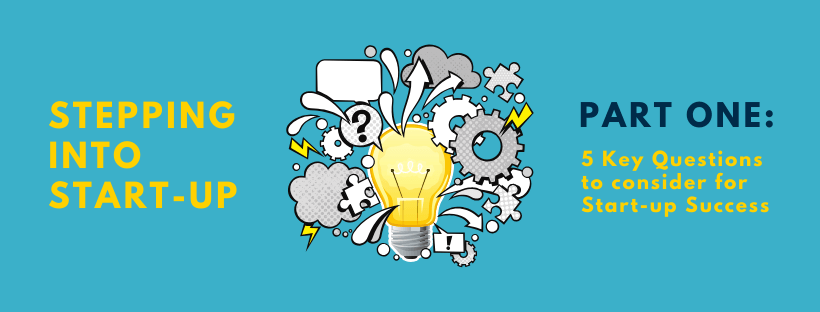Stepping into StartUp – Part 1: 5 Key Questions to consider for Start-up Success
- March 2nd, 2020
- 4 mins READING TIME
You have this kick-ass idea and you’re ready to give it a go in earnest, but first there are 5 key questions you need to consider for start-up success – even before you take the plunge to go it alone.
According to research published by CBInsights, 42% of start-up’s fail because they have failed to do their homework properly. Understanding what people want is possibly the most important aspect of starting a business and bringing a product or service to market. So, if you don’t just want to be remembered as a failed start-up statistic – one that failed because no market existed or it was not clearly defined in the beginning – it is essential that you consider the following 5 key questions to help you achieve your start-up success.
Answering these 5 key questions when starting a business, will not only help you identify any gaps in your plan, but they may well mitigate early failure too.
1. Is your kick-ass idea truly different?
Does your kick-ass idea satisfy a need that no-one else is meeting? Is there a competitive product out there? What will make it different to other similar products that already exist?
If you can clearly articulate the answer to these few questions, then you have taken the first step towards start-up success. However, before turning your idea into a viable business, there’s still much more you need to consider as assumptions will simply not cut the muster in the long term.
2. Who will buy it?
A business with no customers is just that – simply an idea. And, so the second critical question you need to ask is who will buy your product? Who are you targeting? Can you describe them? What do they look like? Where do they live? In other words, defining your target audience visually will help you position your product or service and gain clarity of direction.
3. Why will they buy it?
Each business requires a value proposition which underpins why your customers will buy your product? What problem is it solving for them? Will it add value to their lives? How much will they be willing to pay for it? If you cannot answer these simple questions clearly, then unfortunately you have early indications that you need go back to the drawing board to modify and refine your strategy.
4. Who are your competitors?
Don’t be blinded by the light. Your idea may be good, but you may need to take those blinkers off and keep your mind as open as possible to truly identify who your competitors really are? And it’s not just the direct competitors, there may be indirect competitors too? What do they do that you can do better?
But, don’t be afraid of your competitors. It’s not all doom and gloom as there is a lot you can learn from them. In today’s technology driven world, people tend to have everything they need. If however, you can offer them a better, faster, easier more cost effective way of going around their everyday lives than your competitors, or even have a product or service that resonates with their moral standing or needs, you potentially have every chance of future start-up success.
5. Have you done your research properly?
Do your research. You’ll be amazed at what you can discover from watching your competitors. Not only will this help you clearly establish your point of difference, but it may reveal more opportunities and highlight what it is that you can do better.
When undertaking your research however, do not rely solely on ‘googling’ or advice from friends and family. You need to roll your sleeves up and find ways to get honest feedback from your ideal target audience. It could entail a combination of options including:
- One on one interviews
- Questionnaires or Surveys
- Gathering a sample of potential clients or customers and getting their direct feedback
You may have to spend a bit of money, possibly buying third party research or paying for these focus groups, but consider this as money well spent if it can validate your concept and provide the impetus for success.
Have nothing to fear. Your are not alone.
Most importantly remember that you’re not alone. Do not fear failure. There are many fine people who have flopped early and often, but have gone on to achieve great things.
In conclusion, when you ask the right questions, do your research and learn from those who have gone before you, it is possible for you to increase the opportunity for start-up success.
In Part 2 of Stepping into Start up we will look at “What’s in a name?” – the importance of choosing the right name for your start-up.

